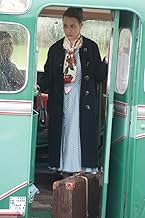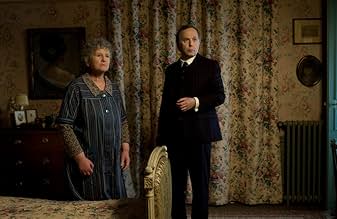CALIFICACIÓN DE IMDb
7.1/10
11 k
TU CALIFICACIÓN
En el París de los sesenta, la vida de una pareja conservadora se pone patas arriba por un grupo de sirvientas españolas que viven en el mismo edificio.En el París de los sesenta, la vida de una pareja conservadora se pone patas arriba por un grupo de sirvientas españolas que viven en el mismo edificio.En el París de los sesenta, la vida de una pareja conservadora se pone patas arriba por un grupo de sirvientas españolas que viven en el mismo edificio.
- Dirección
- Guionistas
- Elenco
- Premios
- 2 premios ganados y 3 nominaciones en total
- Dirección
- Guionistas
- Todo el elenco y el equipo
- Producción, taquilla y más en IMDbPro
Opiniones destacadas
The movie plot about the life of Spanish immigrants in France in the 1960s showing experiences of poor maids as immigrants and adequately reflecting us how was the life of that time . In 1960s Paris, a conservative couple's lives are turned upside down by various Spanish maids . The peculiar marriage called Jean-Louis Joubert (Fabrice Luchini) and Suzanne Joubert (Sandrine Kiberlain) carry out a different life , as Jean-Louis is a hard-working executive and Suzanne is a snobbish wife . The affluent man and the selfish woman live a dull life and they have two arrogant children in a boarding school . At least until due to fortuitous events , there appears Maria (Natalia Verbeke) , the beautiful new maid at the service of Jean-Louis' family, makes him discover the servants' quarter on the sixth floor of the luxurious building he owns and lives in . There lives a community (Carmen Maura as Concepción Ramirez , Lola Dueñas as Berta Ojea as Dolores Carbalan , Nuria Solé as Teresa and Concha Galán as Pilar) of likable Spanish maids , they have said goodbye their families and went abroad . There take place the problems to adapt into a new life ; but later on , they discover a new and agreeable existence . The maids will help Jean-Louis to open to a new culture , introducing him a joyful Spanish group and a new approach of life . In their help and more precisely in the company of charming Maria , Jean-Louis to be turned into a good and philanthropist man .
This interesting film is full of humor , drama , touching scenes and good feeling . It is a simple , dramatic and humorous portrait of a time when the Spanish people had to go other countries in order to encounter a work . This amusing as well as funny picture deals about lives of the immigrants with a minor support in their live condition and including a touching and emotive finale . As in Spain of the 50s and 60s ruled by General Franco there's no job , there's no money , and there's no option for the poor people but to emigrate to a foreign country and attempting to encounter work . As it concerns about the Spanish way of life of a crowd of maids , their habits , costumes ; at the same time they improve the serious but uptight stockbroker who lives a steady yet boring life , being suddenly changed when appear the Spanish maids ; as Jean-Louis will gradually become another man, a better man . Actors are frankly magnificent with a first-rate acting for whole cast . Sensational Fabrice Luchini along with the wife played Sandrine Kinberlain and a gorgeous as well as sympathetic Natalia Verbeke . Special mention to the group of Spanish maids magnificently performed by Carmen Maura , Lola Dueñas , Berta Ojea , among others . Colorful and evocative cinematography by Jean Claude Larrieu . Imaginative as well as sensitive original Music by Jorge Arriagada , Raul Ruiz's usual . It was a success among spectators, as well as a hit smash in the various film festivals it took part in ; as it achieved Prix d'interprétation à Natalia Verbeke au festival Sarlat 2010 .
The motion picture was very well directed by Philippe Le Guay . Philippe Le Guay took inspiration from his own childhood , his father was a stockbroker like Jean-Louis Joubert in the film and he himself had a Spanish maid. This was the number one comedy smash hit from this director . He's a good writer and filmmaker who has directed a few movies , many of them starred by his fetish actor , Fabrice Luchini , such as "Cycling with Moliere" , "The Cost of Living" ¨L'année Juliette¨ and this ¨The Women on the 6th Floor" , his best picture .
This interesting film is full of humor , drama , touching scenes and good feeling . It is a simple , dramatic and humorous portrait of a time when the Spanish people had to go other countries in order to encounter a work . This amusing as well as funny picture deals about lives of the immigrants with a minor support in their live condition and including a touching and emotive finale . As in Spain of the 50s and 60s ruled by General Franco there's no job , there's no money , and there's no option for the poor people but to emigrate to a foreign country and attempting to encounter work . As it concerns about the Spanish way of life of a crowd of maids , their habits , costumes ; at the same time they improve the serious but uptight stockbroker who lives a steady yet boring life , being suddenly changed when appear the Spanish maids ; as Jean-Louis will gradually become another man, a better man . Actors are frankly magnificent with a first-rate acting for whole cast . Sensational Fabrice Luchini along with the wife played Sandrine Kinberlain and a gorgeous as well as sympathetic Natalia Verbeke . Special mention to the group of Spanish maids magnificently performed by Carmen Maura , Lola Dueñas , Berta Ojea , among others . Colorful and evocative cinematography by Jean Claude Larrieu . Imaginative as well as sensitive original Music by Jorge Arriagada , Raul Ruiz's usual . It was a success among spectators, as well as a hit smash in the various film festivals it took part in ; as it achieved Prix d'interprétation à Natalia Verbeke au festival Sarlat 2010 .
The motion picture was very well directed by Philippe Le Guay . Philippe Le Guay took inspiration from his own childhood , his father was a stockbroker like Jean-Louis Joubert in the film and he himself had a Spanish maid. This was the number one comedy smash hit from this director . He's a good writer and filmmaker who has directed a few movies , many of them starred by his fetish actor , Fabrice Luchini , such as "Cycling with Moliere" , "The Cost of Living" ¨L'année Juliette¨ and this ¨The Women on the 6th Floor" , his best picture .
In the 60's, in Paris, the middle-aged stockbroker Jean-Louis Joubert (Fabrice Luchini) is an uptight man that lives with his wife snobbish wife Suzanne (Sandrine Kiberlain) on the first floor of a building that belongs to him. Jean-Louis and Suzanne live a boring life and they have two arrogant sons in a boarding school.
When their maid quits the job, they hire the charming Spanish maid María Gonzalez (María Gonzalez) and Jean-Louis is introduced to a joyful Spanish community of maids on the 6th floor of his building. Jean-Louis learns about the Spanish costumes and improves the lives of the immigrants with minor support in their live condition. He also rekindles his own life with Maria and her friends. But when Maria unexpectedly returns to Spanish, Jean-Louis rethinks his life and values.
"Les Femmes du 6ème Étage" is a delightful romantic comedy based on the fight of classes and cultural differences between the French upper class and the Spanish immigrants in the early 60's in Paris. I loved this film, the cast, the direction, the characters and specially the lovely smile and look of María Gonzalez. My vote is eight.
Title (Brazil): "As Mulheres do 6o Andar" ("The Women of the 6th Floor")
When their maid quits the job, they hire the charming Spanish maid María Gonzalez (María Gonzalez) and Jean-Louis is introduced to a joyful Spanish community of maids on the 6th floor of his building. Jean-Louis learns about the Spanish costumes and improves the lives of the immigrants with minor support in their live condition. He also rekindles his own life with Maria and her friends. But when Maria unexpectedly returns to Spanish, Jean-Louis rethinks his life and values.
"Les Femmes du 6ème Étage" is a delightful romantic comedy based on the fight of classes and cultural differences between the French upper class and the Spanish immigrants in the early 60's in Paris. I loved this film, the cast, the direction, the characters and specially the lovely smile and look of María Gonzalez. My vote is eight.
Title (Brazil): "As Mulheres do 6o Andar" ("The Women of the 6th Floor")
A great movie, with wonderful actress and actor, soft, funny, intelligent and deeper as it seems apparently. If you pay attention the flick will let you think upon many things and, in any case, you will leave the theater in a good and serene mood not only in your mind, but also in your heart. Very refreshing!!! Luchini is excellent (as always) in his wonderful character. He recognize the opportunity to change his life and he seize it on. Today maybe it is hard to imagine that a rich man can show that kind of interest for people of a such different social condition. But in the Sixties sometimes that could happen, the social dehumanization was not so advanced like today, in spite of all the contradictions of those years, which are very well represented. Very good also Kiberlain as his wife. She is perfect in her attitude as snooty new rich. The whole cast of the movie and especially the Spanish women are simply great: they show how a change was urgently requested, at that time... and let us understand, today also!
A great review by Robert Beames (coulden't have done it better myself!!) It has been given the more toner-friendly English language title of Service Entrance, but comic French drama Les Femmes Du 6eme Etage translates literally as The Women on the 6th Floor. Shown out of competition in Berlin, the film was very warmly received thanks in part to the performances of its sweet and amiable leading man, Fabrice Luchini, and its beautiful Spanish leading lady played by Natalia Verbeke. These actors combine with the film's leisurely pacing and entertaining scenario to ensure that it is a winsome and inoffensive crowd-pleaser.
The film, set in the 1960s, follows a wealthy, middle-aged Parisian stockbroker named Jean-Louis (Luchini) whose long-standing maid quits following a row with his demanding wife Suzanne (Sandrine Kiberlain). Unable to clean up after themselves, the couple desperately need a new maid. But when Suzanne's high society friends insist French maids aren't the done thing anymore, she enlists the help of Maria (Natalia Verbeke), a feisty, young Spanish immigrant. Jean-Louis forms an instant and obsessive attraction to her and to all things Spanish, soon striking up unlikely friendships with all the Spanish ladies who live in the servant's quarters above his home – a place he knows nothing about despite living in the building his entire life. Worlds collide and good-natured japes ensue as he helps each lady adjust to life in France whilst himself inheriting a new found love of life.
I don't think it's necessarily a coincidence that both the more shamelessly enjoyable films I've seen here up to now have been broad comedies about cultural difference and histories of mass immigration – with Almanya looking at German-Turks and Service Entrance exploring the relationship, and the comedy that comes of misunderstanding, between the French and their Spanish workforce. Immigration is still a political hot potato issue in these countries, as it remains in much of Europe, and maybe light-hearted comedy is seen as the best way to preach tolerance, reaching a bigger audience than earnest polemic. In mocking bigotry and by setting it in the past (as an old fashioned attitude) perhaps it is felt that people might be less inclined to identify with those views.
In any case both films are funny and have their hearts firmly in the right place. This French offering is gentler and less ballsy than it's Turkish-German counterpart, but no less enjoyable. The character of Jean-Louis is incredibly easy to like, being child-like in his enthusiasm for his new-found interest in Spain. The character of Suzanne is also refreshingly balanced and nuanced. She'd usually be a two-dimensional figure we would be encouraged to dislike in order to make it permissible for Jean-Louis to consider romance with Maria and yet the film doesn't go down that route: she can be annoying and insensitive but she isn't a nasty person. Maria and the other Spanish ladies are also a joy to watch as they interact with one another and fuss over cheerful little Jean-Louis.
Service Entrance is the filmic equivalent of a soufflé and certainly not a tough watch typical of the standard festival fare. Indeed it falls into the dubious realm of the "feel good" movie. But sandwiched, as it is here, between two-hour long Shakespeare adaptations, Bela Tarr movies, Argentinian slow cinema and films about nuclear disasters, it is exactly the kind of film you need to see in order to keep sane. It is difficult to say whether wider criticism in France will be anything like as positive when removed from this context on theatrical release, but here it offered exactly what was needed and nobody appreciated that more than I.
The film, set in the 1960s, follows a wealthy, middle-aged Parisian stockbroker named Jean-Louis (Luchini) whose long-standing maid quits following a row with his demanding wife Suzanne (Sandrine Kiberlain). Unable to clean up after themselves, the couple desperately need a new maid. But when Suzanne's high society friends insist French maids aren't the done thing anymore, she enlists the help of Maria (Natalia Verbeke), a feisty, young Spanish immigrant. Jean-Louis forms an instant and obsessive attraction to her and to all things Spanish, soon striking up unlikely friendships with all the Spanish ladies who live in the servant's quarters above his home – a place he knows nothing about despite living in the building his entire life. Worlds collide and good-natured japes ensue as he helps each lady adjust to life in France whilst himself inheriting a new found love of life.
I don't think it's necessarily a coincidence that both the more shamelessly enjoyable films I've seen here up to now have been broad comedies about cultural difference and histories of mass immigration – with Almanya looking at German-Turks and Service Entrance exploring the relationship, and the comedy that comes of misunderstanding, between the French and their Spanish workforce. Immigration is still a political hot potato issue in these countries, as it remains in much of Europe, and maybe light-hearted comedy is seen as the best way to preach tolerance, reaching a bigger audience than earnest polemic. In mocking bigotry and by setting it in the past (as an old fashioned attitude) perhaps it is felt that people might be less inclined to identify with those views.
In any case both films are funny and have their hearts firmly in the right place. This French offering is gentler and less ballsy than it's Turkish-German counterpart, but no less enjoyable. The character of Jean-Louis is incredibly easy to like, being child-like in his enthusiasm for his new-found interest in Spain. The character of Suzanne is also refreshingly balanced and nuanced. She'd usually be a two-dimensional figure we would be encouraged to dislike in order to make it permissible for Jean-Louis to consider romance with Maria and yet the film doesn't go down that route: she can be annoying and insensitive but she isn't a nasty person. Maria and the other Spanish ladies are also a joy to watch as they interact with one another and fuss over cheerful little Jean-Louis.
Service Entrance is the filmic equivalent of a soufflé and certainly not a tough watch typical of the standard festival fare. Indeed it falls into the dubious realm of the "feel good" movie. But sandwiched, as it is here, between two-hour long Shakespeare adaptations, Bela Tarr movies, Argentinian slow cinema and films about nuclear disasters, it is exactly the kind of film you need to see in order to keep sane. It is difficult to say whether wider criticism in France will be anything like as positive when removed from this context on theatrical release, but here it offered exactly what was needed and nobody appreciated that more than I.
THE WOMEN ON THE 6TH FLOOR (Les femmes du 6ème étage) is a delightful bit of French pastiche that entertains while it also provides insight into several problems - immigration, class distinction, rich controlling poor, and the polar extremes of between the wealth and the working class. Fortunately the story as written by Jérôme Tonnerre and writer/director Philippe Le Guay takes place in the 1960s, offering the audience to glance back at period when social reforms were in the gestational phase and in doing so the film allows the comedy to reign - a fact that makes the reality eventually more poignant.
The story takes place in Paris in 1963 in an elegant neighborhood where Jean-Louis Joubert (Fabrice Luchini) is a serious but uptight stockbroker, married to Suzanne (Sandrine Kiberlain), a starchy class-conscious woman and father of two arrogant teenage boys, (Camille Gigot and Jean-Charles Deval) currently in a boarding school. Jean-Louis lives a steady yet boring life while Suanne busies herself with luncheon appointments, hair appointments, charities, etc. Jean-Louis' mother had been living with the Jouberts until her recent death and now Suzanne forces Jean-Louis to move all of the deceased woman's things to the attic on the 6th floor, an act that infuriates the longtime French maid Germaine (Michèle Gleizer) who leaves the household in disgust. Naturally everything deteriorates an Suzanne must find a new maid. She encounters Maria (Natalia Verbeke) recently immigrated from Spain, offers her a trial employment, and Maria, who becomes friends with the group of maids who live in the disgusting squalor of the 6th floor of the building: naturally these Spanish maids bond and help Maria bring the Joubert household to a state of perfection. Jean-Lois is thrilled with the new maid and discovers the other maids, hears their problems with the sewer and other poor conditions, and sets out to befriend these wonderful ladies who are living in his building : the redoubtable Carmen Maura, Lola Dueñas, Berta Ojea, Nuria Solé, and Concha Galán. These lovely and deeply appreciative lively Spanish maids help Jean- Louis to become open to a new civilization and a new approach of life. In their company - and especially in the company of beautiful Maria - Jean-Louis will gradually become another man, a better man.
The acting is first rate, the subplots embroider the main story with fine finesse, and the sense of the transformation of one wealthy but emotionally vapid man into the loving charmer he becomes makes for a very fine comedy. The ending (three years later) is a bit vapid and cheapens the story quality, but by that time the audience is so entranced with this new vision of camaraderie that it matters little. This is a refreshing, well made, exceptionally entertaining film that boast a particularly fine cast of ensemble actors. In French and Spanish with English subtitles. Grady Harp, March 12
The story takes place in Paris in 1963 in an elegant neighborhood where Jean-Louis Joubert (Fabrice Luchini) is a serious but uptight stockbroker, married to Suzanne (Sandrine Kiberlain), a starchy class-conscious woman and father of two arrogant teenage boys, (Camille Gigot and Jean-Charles Deval) currently in a boarding school. Jean-Louis lives a steady yet boring life while Suanne busies herself with luncheon appointments, hair appointments, charities, etc. Jean-Louis' mother had been living with the Jouberts until her recent death and now Suzanne forces Jean-Louis to move all of the deceased woman's things to the attic on the 6th floor, an act that infuriates the longtime French maid Germaine (Michèle Gleizer) who leaves the household in disgust. Naturally everything deteriorates an Suzanne must find a new maid. She encounters Maria (Natalia Verbeke) recently immigrated from Spain, offers her a trial employment, and Maria, who becomes friends with the group of maids who live in the disgusting squalor of the 6th floor of the building: naturally these Spanish maids bond and help Maria bring the Joubert household to a state of perfection. Jean-Lois is thrilled with the new maid and discovers the other maids, hears their problems with the sewer and other poor conditions, and sets out to befriend these wonderful ladies who are living in his building : the redoubtable Carmen Maura, Lola Dueñas, Berta Ojea, Nuria Solé, and Concha Galán. These lovely and deeply appreciative lively Spanish maids help Jean- Louis to become open to a new civilization and a new approach of life. In their company - and especially in the company of beautiful Maria - Jean-Louis will gradually become another man, a better man.
The acting is first rate, the subplots embroider the main story with fine finesse, and the sense of the transformation of one wealthy but emotionally vapid man into the loving charmer he becomes makes for a very fine comedy. The ending (three years later) is a bit vapid and cheapens the story quality, but by that time the audience is so entranced with this new vision of camaraderie that it matters little. This is a refreshing, well made, exceptionally entertaining film that boast a particularly fine cast of ensemble actors. In French and Spanish with English subtitles. Grady Harp, March 12
¿Sabías que…?
- TriviaPhilippe Le Guay took inspiration from his own childhood. His father was a stockbroker like Jean-Louis Joubert in the film and he himself had a Spanish maid.
- ErroresIn the street, most (if not all) men wear hats, caps or Basque berets. In France, most men stopped wearing headgear in the 1950s (in cities at least). By 1960, the vast majority of men were hatless.
- ConexionesFeatured in Ebert Presents: At the Movies: Episode #2.13 (2011)
- Bandas sonorasItsi Bitsi, Petit Bikini
(Itsy Bitsy Teenie Weenie Yellow Polkadot Bikini)
Music by Lee Pockriss
English lyrics by Paul Vance
French lyrics by Lucien Morisse and André Salvet
Performed by Dalida
© Emily Music Corporation and Music Sales Corporation
Avec l'aimable autorisation de Campbell Connelly France
(P) 1960 Barclay
Avec l'autorisation de Universal Muis Vision
Selecciones populares
Inicia sesión para calificar y agrega a la lista de videos para obtener recomendaciones personalizadas
- How long is The Women on the 6th Floor?Con tecnología de Alexa
Detalles
- Fecha de lanzamiento
- País de origen
- Sitios oficiales
- Idiomas
- También se conoce como
- The Women on the 6th Floor
- Locaciones de filmación
- Productoras
- Ver más créditos de la compañía en IMDbPro
Taquilla
- Presupuesto
- EUR 7,000,000 (estimado)
- Total en EE. UU. y Canadá
- USD 719,823
- Fin de semana de estreno en EE. UU. y Canadá
- USD 26,200
- 9 oct 2011
- Total a nivel mundial
- USD 27,533,970
- Tiempo de ejecución1 hora 42 minutos
- Color
- Mezcla de sonido
- Relación de aspecto
- 1.85 : 1
Contribuir a esta página
Sugiere una edición o agrega el contenido que falta

Principales brechas de datos
By what name was Les femmes du 6e étage (2010) officially released in India in English?
Responda
![Ver Bande-annonce [OV]](https://m.media-amazon.com/images/M/MV5BNTdmOTBjM2UtOTUyMS00NDViLWI4NWEtNmVhODc1NDVjN2NlXkEyXkFqcGdeQXRyYW5zY29kZS13b3JrZmxvdw@@._V1_QL75_UX500_CR0)



























